- Home
- L. Frank Baum
Complete Works of L. Frank Baum Page 15
Complete Works of L. Frank Baum Read online
Page 15
“Sure enough!” exclaimed Tip, noting the fact for the first time. “How, then, am I going to stop him?”
But at that instant the Saw-Horse stopped himself, having concluded it was impossible to see his own body. He saw Tip, however, and came close to the boy to observe him more fully.
It was really comical to see the creature walk; for it moved the legs on its right side together, and those on its left side together, as a pacing horse does; and that made its body rock sidewise, like a cradle.
Tip patted it upon the head, and said “Good boy! Good Boy!” in a coaxing tone; and the Saw-Horse pranced away to examine with its bulging eyes the form of Jack Pumpkinhead.
“I must find a halter for him,” said Tip; and having made a search in his pocket he produced a roll of strong cord. Unwinding this, he approached the Saw-Horse and tied the cord around its neck, afterward fastening the other end to a large tree. The Saw-Horse, not understanding the action, stepped backward and snapped the string easily; but it made no attempt to run away.
“He’s stronger than I thought,” said the boy, “and rather obstinate, too.”
“Why don’t you make him some ears?” asked Jack. “Then you can tell him what to do.”
“That’s a splendid idea!” said Tip. “How did you happen to think of it?”
“Why, I didn’t think of it,” answered the Pumpkinhead; “I didn’t need to, for it’s the simplest and easiest thing to do.”
So Tip got out his knife and fashioned some ears out of the bark of a small tree.
“I mustn’t make them too big,” he said, as he whittled, “or our horse would become a donkey.”
“How is that?” inquired Jack, from the roadside.
“Why, a horse has bigger ears than a man; and a donkey has bigger ears than a horse,” explained Tip.
“Then, if my ears were longer, would I be a horse?” asked Jack.
“My friend,” said Tip, gravely, “you’ll never be anything but a Pumpkinhead, no matter how big your ears are.”
“Oh,” returned Jack, nodding; “I think I understand.”
“If you do, you’re a wonder,” remarked the boy “but there’s no harm in thinking you understand. I guess these ears are ready now. Will you hold the horse while I stick them on?”
“Certainly, if you’ll help me up,” said Jack.
So Tip raised him to his feet, and the Pumpkinhead went to the horse and held its head while the boy bored two holes in it with his knife-blade and inserted the ears.
“They make him look very handsome,” said Jack, admiringly.
But those words, spoken close to the Saw-Horse, and being the first sounds he had ever heard, so startled the animal that he made a bound forward and tumbled Tip on one side and Jack on the other. Then he continued to rush forward as if frightened by the clatter of his own foot-steps.
“Whoa!” shouted Tip, picking himself up; “whoa! you idiot whoa!” The Saw-Horse would probably have paid no attention to this, but just then it stepped a leg into a gopher-hole and stumbled head-over-heels to the ground, where it lay upon its back, frantically waving its four legs in the air.
Tip ran up to it.
“You’re a nice sort of a horse, I must say!” he exclaimed. “Why didn’t you stop when I yelled ‘whoa?’“
“Does ‘whoa’ mean to stop?” asked the Saw-Horse, in a surprised voice, as it rolled its eyes upward to look at the boy.
“Of course it does,” answered Tip.
“And a hole in the ground means to stop, also, doesn’t it?” continued the horse.
“To be sure; unless you step over it,” said Tip.
“What a strange place this is,” the creature exclaimed, as if amazed. “What am I doing here, anyway?”
“Why, I’ve brought you to life,” answered the boy “but it won’t hurt you any, if you mind me and do as I tell you.”
“Then I will do as you tell me,” replied the Saw-Horse, humbly. “But what happened to me, a moment ago? I don’t seem to be just right, someway.”
“You’re upside down,” explained Tip. “But just keep those legs still a minute and I’ll set you right side up again.”
“How many sides have I?” asked the creature, wonderingly.
“Several,” said Tip, briefly. “But do keep those legs still.”
The Saw-Horse now became quiet, and held its legs rigid; so that Tip, after several efforts, was able to roll him over and set him upright.
“Ah, I seem all right now,” said the queer animal, with a sigh.
“One of your ears is broken,” Tip announced, after a careful examination. “I’ll have to make a new one.”
Then he led the Saw-Horse back to where Jack was vainly struggling to regain his feet, and after assisting the Pumpkinhead to stand upright Tip whittled out a new ear and fastened it to the horse’s head.
“Now,” said he, addressing his steed, “pay attention to what I’m going to tell you. ‘Whoa!’ means to stop; ‘Get-Up!’ means to walk forward; ‘Trot!’ means to go as fast as you can. Understand?”
“I believe I do,” returned the horse.
“Very good. We are all going on a journey to the Emerald City, to see His Majesty, the Scarecrow; and Jack Pumpkinhead is going to ride on your back, so he won’t wear out his joints.”
“I don’t mind,” said the Saw-Horse. “Anything that suits you suits me.”
Then Tip assisted Jack to get upon the horse.
“Hold on tight,” he cautioned, “or you may fall off and crack your pumpkin head.”
“That would be horrible!” said Jack, with a shudder. “What shall I hold on to?”
“Why, hold on to his ears,” replied Tip, after a moment’s hesitation.
“Don’t do that!” remonstrated the Saw-Horse; “for then I can’t hear.”
That seemed reasonable, so Tip tried to think of something else.
“I’ll fix it!” said he, at length. He went into the wood and cut a short length of limb from a young, stout tree. One end of this he sharpened to a point, and then he dug a hole in the back of the Saw-Horse, just behind its head. Next he brought a piece of rock from the road and hammered the post firmly into the animal’s back.
“Stop! Stop!” shouted the horse; “you’re jarring me terribly.”
“Does it hurt?” asked the boy.
“Not exactly hurt,” answered the animal; “but it makes me quite nervous to be jarred.”
“Well, it’s all over now” said Tip, encouragingly. “Now, Jack, be sure to hold fast to this post and then you can’t fall off and get smashed.”
So Jack held on tight, and Tip said to the horse:
“Get up.”
The obedient creature at once walked forward, rocking from side to side as he raised his feet from the ground.
Tip walked beside the Saw-Horse, quite content with this addition to their party. Presently he began to whistle.
“What does that sound mean?” asked the horse.
“Don’t pay any attention to it,” said Tip. “I’m just whistling, and that only means I’m pretty well satisfied.”
“I’d whistle myself, if I could push my lips together,” remarked Jack. “I fear, dear father, that in some respects I am sadly lacking.”
After journeying on for some distance the narrow path they were following turned into a broad roadway, paved with yellow brick. By the side of the road Tip noticed a sign-post that read:
“NINE MILES TO THE EMERALD CITY.”
But it was now growing dark, so he decided to camp for the night by the roadside and to resume the journey next morning by daybreak. He led the Saw-Horse to a grassy mound upon which grew several bushy trees, and carefully assisted the Pumpkinhead to alight.
“I think I’ll lay you upon the ground, overnight,” said the boy. “You will be safer that way.”
“How about me?” asked the Saw-Horse.
“It won’t hurt you to stand,” replied Tip; “and, as you can’t sleep, you may as well
watch out and see that no one comes near to disturb us.”
Then the boy stretched himself upon the grass beside the Pumpkinhead, and being greatly wearied by the journey was soon fast asleep.
Jack Pumpkinhead’s Ride to the Emerald City
At daybreak Tip was awakened by the Pumpkinhead. He rubbed the sleep from his eyes, bathed in a little brook, and then ate a portion of his bread and cheese. Having thus prepared for a new day the boy said:
“Let us start at once. Nine miles is quite a distance, but we ought to reach the Emerald City by noon if no accidents happen.” So the Pumpkinhead was again perched upon the back of the Saw-Horse and the journey was resumed.
Tip noticed that the purple tint of the grass and trees had now faded to a dull lavender, and before long this lavender appeared to take on a greenish tinge that gradually brightened as they drew nearer to the great City where the Scarecrow ruled.
The little party had traveled but a short two miles upon their way when the road of yellow brick was parted by a broad and swift river. Tip was puzzled how to cross over; but after a time he discovered a man in a ferry-boat approaching from the other side of the stream.
When the man reached the bank Tip asked:
“Will you row us to the other side?”
“Yes, if you have money,” returned the ferryman, whose face looked cross and disagreeable.
“But I have no money,” said Tip.
“None at all?” inquired the man.
“None at all,” answered the boy.
“Then I’ll not break my back rowing you over,” said the ferryman, decidedly.
“What a nice man!” remarked the Pumpkinhead, smilingly.
The ferryman stared at him, but made no reply. Tip was trying to think, for it was a great disappointment to him to find his journey so suddenly brought to an end.
“I must certainly get to the Emerald City,” he said to the boatman; “but how can I cross the river if you do not take me?”
The man laughed, and it was not a nice laugh.
“That wooden horse will float,” said he; “and you can ride him across. As for the pumpkinheaded loon who accompanies you, let him sink or swim it won’t matter greatly which.”
“Don’t worry about me,” said Jack, smiling pleasantly upon the crabbed ferryman; “I’m sure I ought to float beautifully.”
Tip thought the experiment was worth making, and the Saw-Horse, who did not know what danger meant, offered no objections whatever. So the boy led it down into the water and climbed upon its back. Jack also waded in up to his knees and grasped the tail of the horse so that he might keep his pumpkin head above the water.
“Now,” said Tip, instructing the Saw-Horse, “if you wiggle your legs you will probably swim; and if you swim we shall probably reach the other side.”
The Saw-Horse at once began to wiggle its legs, which acted as oars and moved the adventurers slowly across the river to the opposite side. So successful was the trip that presently they were climbing, wet and dripping, up the grassy bank.
Tip’s trouser-legs and shoes were thoroughly soaked; but the Saw-Horse had floated so perfectly that from his knees up the boy was entirely dry. As for the Pumpkinhead, every stitch of his gorgeous clothing dripped water.
“The sun will soon dry us,” said Tip “and, anyhow, we are now safely across, in spite of the ferryman, and can continue our journey.”
“I didn’t mind swimming, at all,” remarked the horse.
“Nor did I,” added Jack.
They soon regained the road of yellow brick, which proved to be a continuation of the road they had left on the other side, and then Tip once more mounted the Pumpkinhead upon the back of the Saw-Horse.
“If you ride fast,” said he, “the wind will help to dry your clothing. I will hold on to the horse’s tail and run after you. In this way we all will become dry in a very short time.”
“Then the horse must step lively,” said Jack.
“I’ll do my best,” returned the Saw-Horse, cheerfully.
Tip grasped the end of the branch that served as tail to the Saw-Horse, and called loudly: “Get-up!”
The horse started at a good pace, and Tip followed behind. Then he decided they could go faster, so he shouted: “Trot!”
Now, the Saw-Horse remembered that this word was the command to go as fast as he could; so he began rocking along the road at a tremendous pace, and Tip had hard work — running faster than he ever had before in his life — to keep his feet.
Soon he was out of breath, and although he wanted to call “Whoa!” to the horse, he found he could not get the word out of his throat. Then the end of the tail he was clutching, being nothing more than a dead branch, suddenly broke away, and the next minute the boy was rolling in the dust of the road, while the horse and its pumpkin-headed rider dashed on and quickly disappeared in the distance.
By the time Tip had picked himself up and cleared the dust from his throat so he could say “Whoa!” there was no further need of saying it, for the horse was long since out of sight.
So he did the only sensible thing he could do. He sat down and took a good rest, and afterward began walking along the road.
“Some time I will surely overtake them,” he reflected; “for the road will end at the gates of the Emerald City, and they can go no further than that.”
Meantime Jack was holding fast to the post and the Saw-Horse was tearing along the road like a racer. Neither of them knew Tip was left behind, for the Pumpkinhead did not look around and the Saw-Horse couldn’t.
As he rode, Jack noticed that the grass and trees had become a bright emerald-green in color, so he guessed they were nearing the Emerald City even before the tall spires and domes came into sight.
At length a high wall of green stone, studded thick with emeralds, loomed up before them; and fearing the Saw-Horse would not know enough to stop and so might smash them both against this wall, Jack ventured to cry “Whoa!” as loud as he could.
So suddenly did the horse obey that had it not been for his post Jack would have been pitched off head foremost, and his beautiful face ruined.
“That was a fast ride, dear father!” he exclaimed; and then, hearing no reply, he turned around and discovered for the first time that Tip was not there.
This apparent desertion puzzled the Pumpkinhead, and made him uneasy. And while he was wondering what had become of the boy, and what he ought to do next under such trying circumstances, the gateway in the green wall opened and a man came out.
This man was short and round, with a fat face that seemed remarkably good-natured. He was clothed all in green and wore a high, peaked green hat upon his head and green spectacles over his eyes. Bowing before the Pumpkinhead he said:
“I am the Guardian of the Gates of the Emerald City. May I inquire who you are, and what is your business?”
“My name is Jack Pumpkinhead,” returned the other, smilingly; “but as to my business, I haven’t the least idea in the world what it is.”
The Guardian of the Gates looked surprised, and shook his head as if dissatisfied with the reply.
“What are you, a man or a pumpkin?” he asked, politely.
“Both, if you please,” answered Jack.
“And this wooden horse — is it alive?” questioned the Guardian.
The horse rolled one knotty eye upward and winked at Jack. Then it gave a prance and brought one leg down on the Guardian’s toes.
“Ouch!” cried the man; “I’m sorry I asked that question. But the answer is most convincing. Have you any errand, sir, in the Emerald City?”
“It seems to me that I have,” replied the Pumpkinhead, seriously; “but I cannot think what it is. My father knows all about it, but he is not here.”
“This is a strange affair very strange!” declared the Guardian. “But you seem harmless. Folks do not smile so delightfully when they mean mischief.”
“As for that,” said Jack, “I cannot help my smile, for it is carved on my
face with a jack-knife.”
“Well, come with me into my room,” resumed the Guardian, “and I will see what can be done for you.”
So Jack rode the Saw-Horse through the gateway into a little room built into the wall. The Guardian pulled a bell-cord, and presently a very tall soldier — clothed in a green uniform — entered from the opposite door. This soldier carried a long green gun over his shoulder and had lovely green whiskers that fell quite to his knees. The Guardian at once addressed him, saying:
“Here is a strange gentleman who doesn’t know why he has come to the Emerald City, or what he wants. Tell me, what shall we do with him?”
The Soldier with the Green Whiskers looked at Jack with much care and curiosity. Finally he shook his head so positively that little waves rippled down his whiskers, and then he said:
“I must take him to His Majesty, the Scarecrow.”
“But what will His Majesty, the Scarecrow, do with him?” asked the Guardian of the Gates.
“That is His Majesty’s business,” returned the soldier. “I have troubles enough of my own. All outside troubles must be turned over to His Majesty. So put the spectacles on this fellow, and I’ll take him to the royal palace.”
So the Guardian opened a big box of spectacles and tried to fit a pair to Jack’s great round eyes.
“I haven’t a pair in stock that will really cover those eyes up,” said the little man, with a sigh; “and your head is so big that I shall be obliged to tie the spectacles on.”
“But why need I wear spectacles?” asked Jack.
“It’s the fashion here,” said the Soldier, “and they will keep you from being blinded by the glitter and glare of the gorgeous Emerald City.”
“Oh!” exclaimed Jack. “Tie them on, by all means. I don’t wish to be blinded.”
“Nor I!” broke in the Saw-Horse; so a pair of green spectacles was quickly fastened over the bulging knots that served it for eyes.
Then the Soldier with the Green Whiskers led them through the inner gate and they at once found themselves in the main street of the magnificent Emerald City.

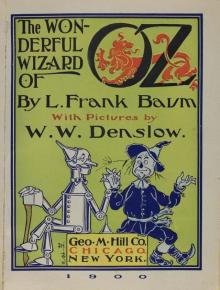 The Wonderful Wizard of Oz
The Wonderful Wizard of Oz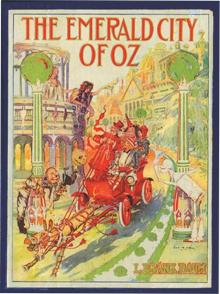 The Emerald City of Oz
The Emerald City of Oz The Story of Peter Pan, Retold from the fairy play by Sir James Barrie
The Story of Peter Pan, Retold from the fairy play by Sir James Barrie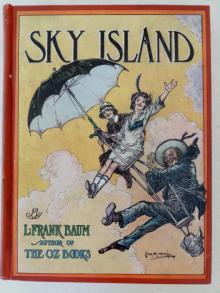 Sky Island
Sky Island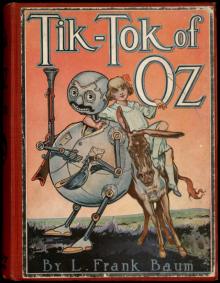 Tik-Tok of Oz
Tik-Tok of Oz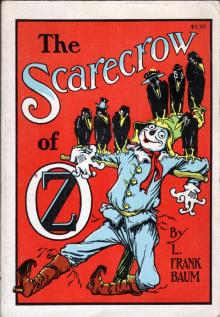 The Scarecrow of Oz
The Scarecrow of Oz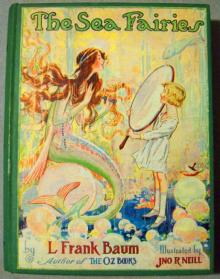 The Sea Fairies
The Sea Fairies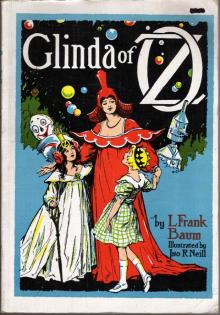 Glinda of Oz
Glinda of Oz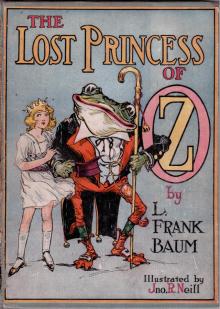 The Lost Princess of Oz
The Lost Princess of Oz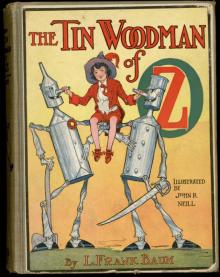 The Tin Woodman of Oz
The Tin Woodman of Oz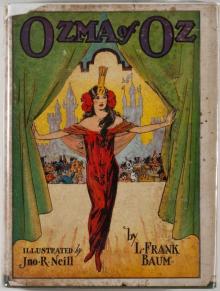 Ozma of Oz
Ozma of Oz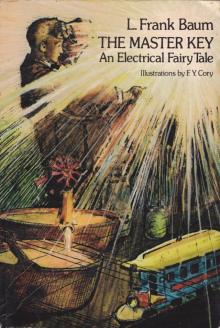 The Master Key
The Master Key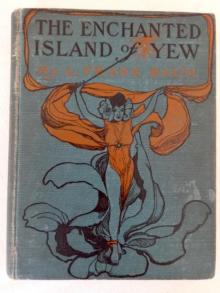 The Enchanted Island of Yew
The Enchanted Island of Yew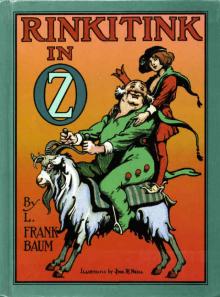 Rinkitink in Oz
Rinkitink in Oz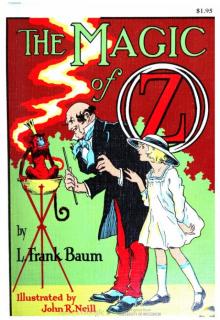 The Magic of Oz
The Magic of Oz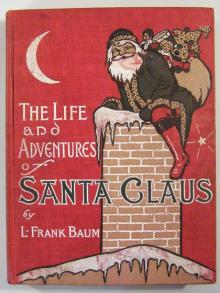 The Life and Adventures of Santa Claus
The Life and Adventures of Santa Claus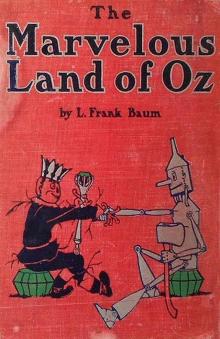 The Marvelous Land of Oz
The Marvelous Land of Oz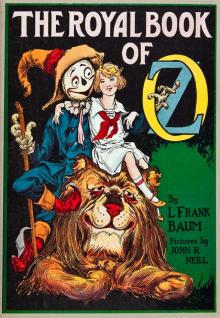 The Royal Book of Oz
The Royal Book of Oz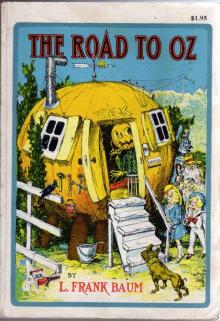 The Road to Oz
The Road to Oz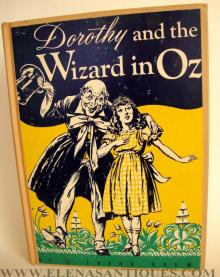 Dorothy and the Wizard in Oz
Dorothy and the Wizard in Oz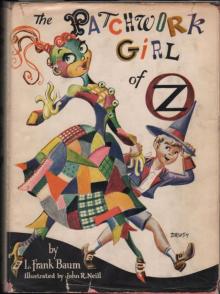 The Patchwork Girl of Oz
The Patchwork Girl of Oz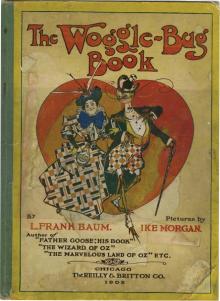 The Woggle-Bug Book
The Woggle-Bug Book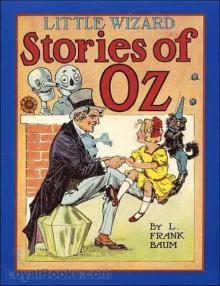 Little Wizard Stories of Oz
Little Wizard Stories of Oz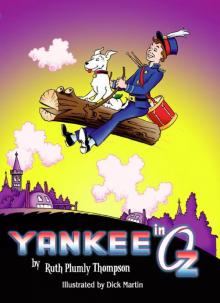 Yankee in Oz
Yankee in Oz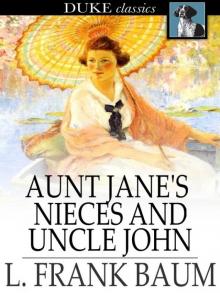 Aunt Jane's Nieces and Uncle John
Aunt Jane's Nieces and Uncle John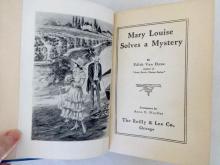 Mary Louise
Mary Louise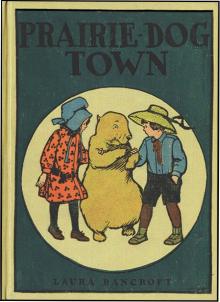 Prairie-Dog Town
Prairie-Dog Town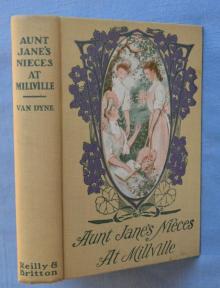 Aunt Jane's Nieces at Millville
Aunt Jane's Nieces at Millville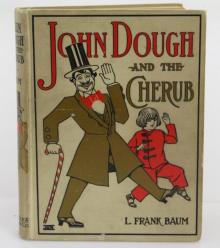 John Dough and the Cherub
John Dough and the Cherub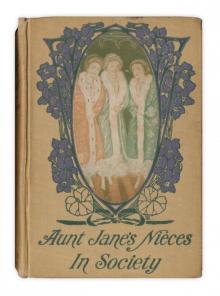 Aunt Jane's Nieces in Society
Aunt Jane's Nieces in Society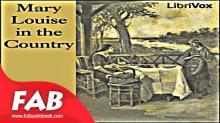 Mary Louise in the Country
Mary Louise in the Country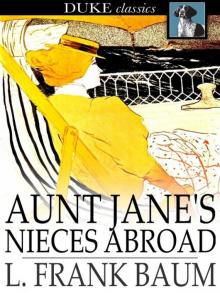 Aunt Jane's Nieces Abroad
Aunt Jane's Nieces Abroad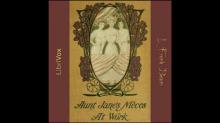 Aunt Jane's Nieces at Work
Aunt Jane's Nieces at Work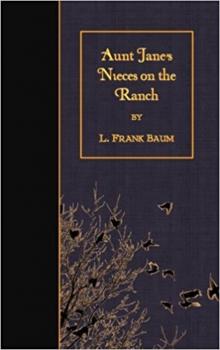 Aunt Jane's Nieces on the Ranch
Aunt Jane's Nieces on the Ranch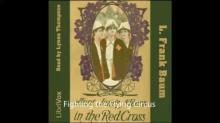 Aunt Jane's Nieces in the Red Cross
Aunt Jane's Nieces in the Red Cross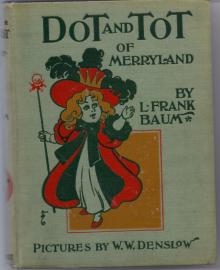 Dot and Tot of Merryland
Dot and Tot of Merryland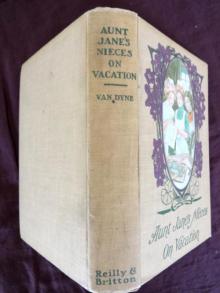 Aunt Jane's Nieces on Vacation
Aunt Jane's Nieces on Vacation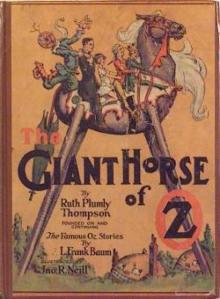 The Giant Horse Of Oz
The Giant Horse Of Oz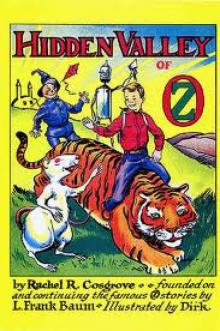 The Hidden Valley of Oz
The Hidden Valley of Oz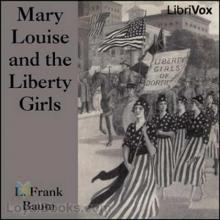 Mary Louise and the Liberty Girls
Mary Louise and the Liberty Girls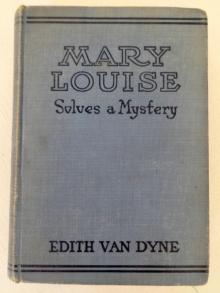 Mary Louise Solves a Mystery
Mary Louise Solves a Mystery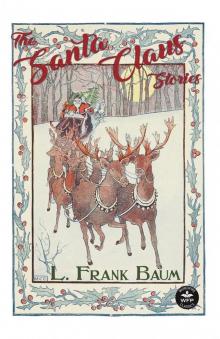 The Santa Claus Stories
The Santa Claus Stories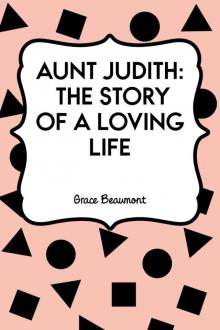 Aunt Judith: The Story of a Loving Life
Aunt Judith: The Story of a Loving Life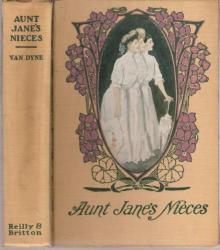 Aunt Jane's Nieces
Aunt Jane's Nieces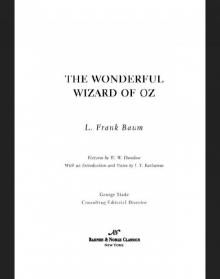 Wonderful Wizard of Oz (Barnes & Noble Classics Series)
Wonderful Wizard of Oz (Barnes & Noble Classics Series)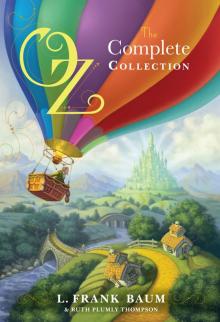 Oz, The Complete Collection
Oz, The Complete Collection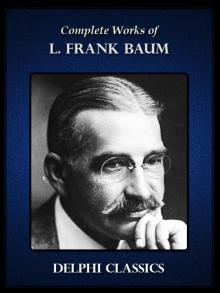 Complete Works of L. Frank Baum
Complete Works of L. Frank Baum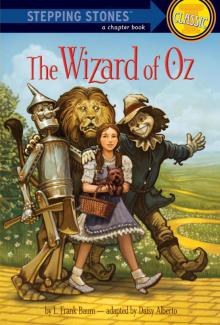 The Wizard of Oz
The Wizard of Oz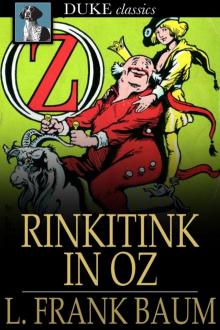 Oz 10 - Rinkitink in Oz
Oz 10 - Rinkitink in Oz